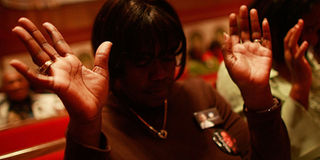Prime
Encountering Jesus in ordinary life

A family that prays together stays together. Photo | Net.
What you need to know:
- Man of God. Although Jesus was human and divine, He came out of a peasant background. He lived far away from all the great people, great cities, and great events, writes Msgr. John Wynand Katende
“There are also many other things that Jesus did, but if these were to be described individually, I do not think the whole world would contain the books that would be written. But these have been recorded so that you may believe that Jesus is the Messiah, the Son of God, and so that through believing you may have life in his name.”- John 21:25-26
Jesus Christ is the man no one can ignore. The international civic calendar rotates around Him. He is the Alpha and the Omega (Revelation 21:6). We celebrate feasts around His birth, then His baptism as an adult, at the age of 30. But we actually know very little of what are sometimes called His “Hidden Years” (between approximately ages 12-30). Luke 2:52 simply summarizes them: “And Jesus increased in wisdom and in years, and in divine and human favor.”
The Bible is generally not a book of history, but primarily a book of religion, a guide to faith. It comprises of stories of faith in action. Abraham, for example, has been recognized as father/founder of monotheism. Yet we only begin to encounter him, when God calls him at the age of 75! (Genesis 12:1-4). Nothing prior his call is revealed to us. But his faith story speaks volumes to us. Joseph of Nazareth played a crucial role in the life of Jesus, yet so little is said about him. Matthew 1:19 simply says that he was a man of great faith (righteous).
The hidden years of Jesus mean that He lived a normal life, like any other Jewish child. He had to learn many things, including speaking and reading. He had to learn about the Jewish law and about carpentry. Jesus’ teaching and miracles must have come through a journey of faith, in relationship to His divine Father. As a devout Jew, Jesus grew up in constant prayer and meditative reading of the scriptures (2 Timothy 3:14-17). By the age of twelve, He had figured out what precisely His mission was from God (Luke 2:49).
Although Jesus was human and divine, He came out of a peasant background. He lived far away from all the great people, great cities, and great events. He lived in poverty and lowliness: the Mother He chose was a poor woman; His foster-father was a carpenter; the town in which He spent the greatest part of His life was an obscure place despised by the Jews: “Can anything good come out of Nazareth?” (John 1:46).
The message of Jesus is addressed to all people, without distinction. It is addressed particularly to the excluded and the poor. Jesus says about them that they are the first to have access to full communion with God (Matthew 5:3). He wants us to live just like small children who can easily entrust themselves entirely to the care and love of their parents.
The fact that Jesus actually lived, died on a cross and then rose from the dead, is of greatest importance for the Christian faith. He instituted a new sacrifice, which is of Himself on the cross. He wanted it to be perpetuated through the ordinary species of bread and wine, by simple words of consecration, through a simple priest (Luke 22:20).
The hidden life of Jesus is very important for our own spiritual journeys. It means that an ordinary life is very important to God. In other words: even a simple, unknown life in all humility is valuable. It can be a divine life.
If we want to follow Jesus by words and deeds in the service of His Kingdom, we must first of all strive to follow Him in His simple, unspectacular, and very ordinary hidden life. “Be a witness to Jesus Christ in the way you conduct your ordinary, everyday life, and it will become a masterpiece for God,”- Pope Francis.
Tit bits…
Matthew 5:3
Poor in spirit’ is an odd phrase to modern ears, outside religious circles anyway. The traditional explanation, especially among evangelicals, is that it means people who recognise their own spiritual poverty, their need for God.
Poor in spirit’ is an odd phrase to modern ears, outside religious circles anyway.





